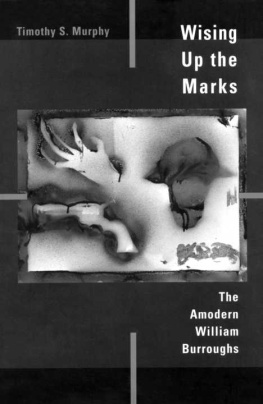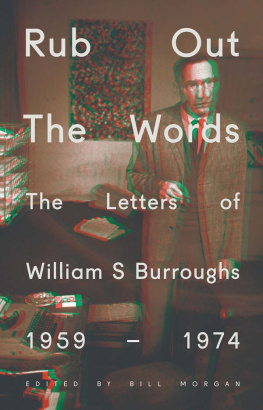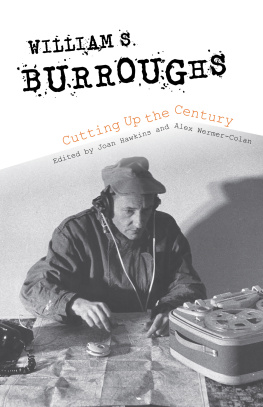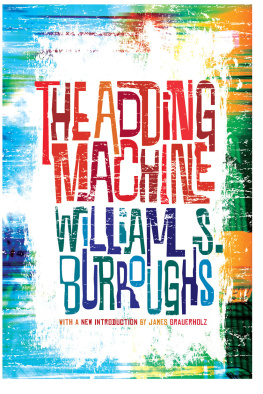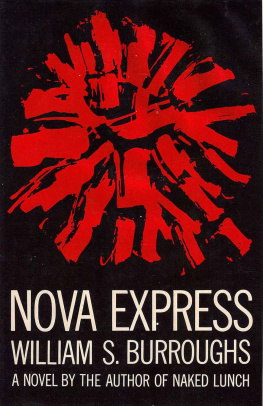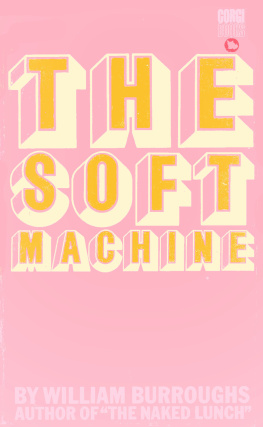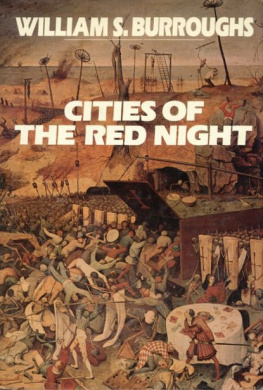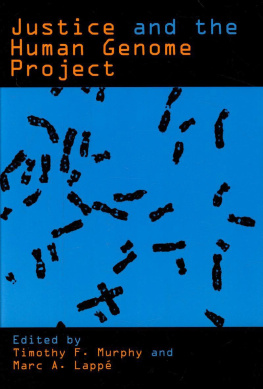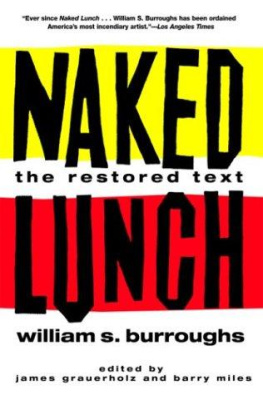Timothy S. Murphy




For my parents, Thomas A. S. Murphy (1939-1993), Joyce E. Briggs and Robert L. Briggs
Introduction:
Chapter One
Chapter Two
Chapter Three
Chapter Four
Chapter Five
Chapter Six
Conclusion:
In this study, William S. Burroughs's novels are cited parenthetically using the following abbreviations and editions:











I owe my most profound intellectual debts to my committee chair, Vince Pecora, who never misses a trick, avoids a debate, or pulls a punch yet somehow manages to assure his students of the value of their achievements, and to Ken Reinhard, who is as profligate in his interests as he is in his generosity. Sam Weber and Peter Wollen also gave me crucial advice and encouragement during that long march to the doctorate. Toni Negri has no doubt forgotten the spontaneous remarks he made in reaction to my underdeveloped theses in the fall of i99i, but those remarks and the paper I wrote in response to them were the true seeds of this book. I would also like to affirm my gratitude to my original chair, the late Joe Riddel, whose goodwill and encouragement allowed me to get this project under way in the first place. Jeffrey Nealon and Steven Shaviro, referees for the University of California Press, offered helpful suggestions for clarification, for which I thank them. Don't blame them for the obscurities and errors that remain.
The contributions of my comrades in arms-those who passed through graduate school with me-to this book have in many cases spanned as many years as I've known them. They watched me back into the project, just as they are now watching me back out the other side of it. Among the many who heard evasions, rehearsals, and revisions of the arguments herein, Luke Carson, Roxanne Eberle, and Colleen Jaurretche have surely put up longest with my vacillations and have done so with admirable restraint and good humor. Don't blame them, either.
What Juliana has given me is not visible in any specific aspect of the contents of this book, but rather in its very existence. I do not know why there should be something rather than nothing, but I'm glad that there is.
Sections of chapters i and 3 appeared under the title "William S. Burroughs between Indifference and Revalorization: Notes toward a Political Reading" in Angelaki 1.1 (1993), and another section of chapter 3 appeared in Angelaki 1.3 (1994) under the title "Herculean Tasks, Dionysian Labor: Michael Hardt and Antonio Negri on the Contemporary State-Form." Those sections appear here, in dismembered and revised form, by permission of Angelaki. Lyrics from "Caught, Can We Get a Witness?" by Ridenhour, Shocklee, and Sadler are quoted by permission of Def American Songs/Def Jam Recordings.


This study attempts to articulate an alternative to the dialectic of modernism and postmodernism, or (post)modernism for short, that dominates many discussions of American literature in the contemporary period. Such an alternative has already emerged at many points in the development of that literature, only to be misrecognized and recuperated within the dominant mode of reflexive postmodern writing by critics who have apparently been too dazzled by the postmodern and poststructural "ruptures" to see clearly. An alternative to (post)modernism in fact emerges at precisely the same aesthetic moment that the dominant or reflexive form of postmodernism does, in one of its key texts: Ralph Ellison's Invisible Man. Like Ellison's narrator, this alternative has remained largely invisible, despite its very real difference from its dominant counterpart, for many of the same reasons the narrator could not be seen by members of the dominant white culture. Unlike Ellison's canonical book, however, the major texts of this alternative form have only intermittently been recognized for their contributions to the state of contemporary cultural production, and these texts have not yet given rise to an adequate theoretical alternative to (post)modernism. Questions of cultural identity and otherness, of representation and materiality raised by Ellison's novel will help us begin to recognize and theorize this alternative as it takes shape in the novels of William S. Burroughs.
The explicit theoretical elaboration of alternatives to (post)mod- ernism has begun recently in disciplines other than literary criticism, such as the sociology of Bruno Latour (who calls it "nonmodernism")1 and the political philosophy of Antonio Negri (who calls it "anti- modernity").2 These particular elaborations derive from the philosophical work of Gilles Deleuze, whose original insights and analyses have produced a critical language that evades the endless squabbling over terminology that marks most discussions of (post)modernism; this evasion also accounts in part for Deleuze's own relative "invisibility" in Anglophone critical circles. To make my own project more visible, I have chosen to call my version of the phenomenon amodernism to highlight what seems to me to be its distance from and resistance to the dialectical structure that defines (post)modernism; perhaps it would help to think of it as a heterogeneous third term, like "amoral" in relation to "moral" and "immoral." Amodernism, like the reflexive postmodernism we already recognize, accepts the failure of modernist ends (for instance, the resolution of gender, class, and ethnic conflicts and the concomitant spiritual unification of society) and means (for instance, the regeneration of myth as a centering structure), without taking the additional step of homogenizing all remaining difference into some version of Ferdinand de Saussure's negatively defined linguistic paradigm.3 In other words, from an amodern point of view the disavowal of mass politics endorsed by JeanFrancois Lyotard's or jean Baudrillard's postmodernism is not adequate, since that disavowal remains complicit with capital because it offers no way out of the system of domination that constitutes the present social order. The failure of a specific set of critical and resistant strategies, even strategies as far-reaching and apparently unsurpassable as those deployed under modernism, does not necessarily imply the failure of all such strategies, nor does the "closure of Western metaphysics" require us to jettison every point of our irreducible cultural histories.

